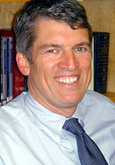CTSI Invites UCSF Input to Inform its Renewal Proposal

Clay Johnston
UCSF’s Clinical and Translational Science Institute (CTSI) is preparing a proposal to renew its grant and is once again reaching out to the broader University community for ideas to shape its future.
Established in 2006, the CTSI extends across all four UCSF schools dentistry, medicine, nursing and pharmacy and the Graduate Division. It is designed to create an enterprise that promotes research and education in translational and clinical science at UCSF, in partnership with its training hospitals, affiliated institutions and the larger health care community.
In CTSI’s original submission to National Institute of Health (NIH), more than 200 faculty members at UCSF and colleagues at its partner institutes in the San Francisco Bay Area collaborated to provide substantive input.
The spirit of open innovation was alive and well, resulting in a $117 million, five-year grant to UCSF from the National Center for Research Resources (NCRR), inducting the University as a member of the first class of 12 in the now 46-member national Clinical & Translational Science Award (CTSA) consortium.
The award, as implemented by CTSI, is at its core about driving innovation in research by providing infrastructure, services and advocacy to improve the translation of basic science to better health for communities.
Over the next four weeks, CTSI invites anyone at UCSF and its affiliates who are interested in influencing the direction of the renewal proposal to submit ideas and contact the leadership about participating via a novel, web-based tool called “Open Forum.”
CTSI Open Forum
Add your ideas to the accumulating set of ideas at http://ctsi.ucsf.edu/renewal
“Opening the doors to ideas from the entire campus is the best way to generate transformative ideas,” says CTSI Director Clay Johnston, MD, PhD, associate vice chancellor of research at UCSF. “When we’ve used the Open Forum tool in the past, which is a great platform for open and collaborative innovation, we had a much larger group of contributors than we could have identified otherwise. We received some excellent ideas and comments, many of which have been implemented.”
Mike McCune, MD, PhD, professor of medicine, CTSI board member and the founding director of CTSI, adds, “I’m looking forward to building on the collaborative spirit that drove the success of the original proposal.”
Driving Innovation
For UCSF’s CTSI, the focus on innovation goes even further driving the University to continually search for creative ways to improve the impact of its work through introspection fueled by the broadest set of ideas, Johnston says.
CTSI is not alone in this type of effort. Large companies like IBM have begun to adopt approaches, often using new types of web-based tools, to gather the best ideas from a broad company-wide base to come up with the most innovative ways to solve pressing challenges.
Over the past three years, CTSI has provided resources for investigators at UCSF and affiliates that facilitate clinical and translational research and education. For example, last year CTSI provided more than 5,000 hours of consulting services to trainees and faculty in areas such as biostatistics, research design, health policy, ethics and community engagement. The CTSI Clinical Research Center has expanded from three to nine locations. And a frequently accessed website continues to serve as a ‘Virtual Home’ for clinical and translational researchers at UCSF.
The goal of translational research is to take the discoveries made at the lab bench and determine how they might be applied to preventing, managing or curing diseases in people.
“I’m especially proud of collaborations we’ve facilitated across units at UCSF, such as the recent partnership with the Cancer Center in developing a Phase 1 clinical trials unit at Mount Zion,” says Susan Autry, MBA, executive director of CTSI.
CTSI also has worked with UCSF leadership to foster collaborative ventures, catalyzing, such as forming the Resource Allocation Program (RAP), an umbrella organization that brings together the majority of intramural funding sources at UCSF, streamlining the way faculty seek intramural funding. Under RAP, major funding sources have a single application and a more efficient review process.
For the renewal application, CTSI will focus on core successes and continue to create and support innovative approaches that enhance its ability to conduct the best clinical and translational research. Current areas of focus include T1 (bench to bedside), T2 (bedside to community), comparative effectiveness research, clinical research services, information technology, consultation services, regulatory and approval processes and training.
“We’d like to focus on prior successes and core areas we know are necessary to achieve our mission, but as always we continue to want to hear from others regarding things we may have missed or novel ways of addressing core challenges,” explains Deborah Grady, MD, MPH, CTSI’s co-director.
Related Links:
UCSF Set to Transform Itself into Engine of Translational Research
UCSF Today, Oct. 3, 2006
UCSF Leaders Reflect on Significance of Clinical and Translational Science Institute